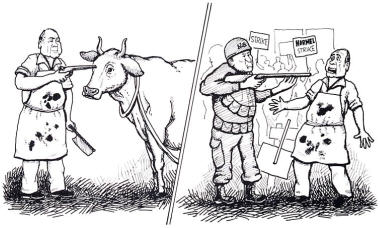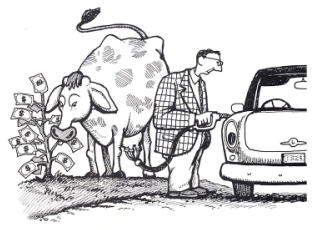Transcendental Commentary on the Issues of the Day
Wholesale Slaughter
Striking meat-packers and their supporters blockaded the Geo. A. Hormel & Co. plant Monday, and Gov. Rudy Perpich called out the National Guard to prevent violence as workers crossed the picket lines. Associated Press, Jan. 21, 1986
Governor Rudy Perpich is certainly to be commended for using the forces at his command to prevent violence at the Hormel meat-packing plant in Austin, Minnesota; however, the human-to-human violence outside the plant's gates was insignificant compared to the usual human-to-animal violence within.

Governor Perpich did nothing to prevent this violence. A government leader trained in Vedic philosophy, however, would have acted differently. He would have used the National Guard troops to shut down the meat-packing plant altogether. Such a leader would see not only human beings but also the animals as praja, or citizens. In his commentary on Srimad-Bhagavatam, Srila Prabhupada explains, "The word praja refers to one who has taken birth within the jurisdiction of the government. All living beings, whether human, animal, or lower than animal, should be given protection."
Stopping the killing of the animals is not merely an act of compassion toward the animals. According to the law of karma, the acts of violence being carried out against the animals in the meat-packing plant will eventually generate reactions affecting humans, individually and collectively. Srila Prabhupada states, "If one kills many thousands of animals in a professional way so that other people can purchase the meat to eat, one must be ready to be killed in a similar way in his next life and in life after life. . . . According to Judeo-Christian scriptures, it is clearly said, 'Thou shalt not kill.' Nonetheless, giving all kinds of excuses, even the heads of religion indulge in killing animals while trying to pass as saintly persons. This mockery and hypocrisy in human society bring about unlimited calamities; therefore occasionally there are great wars. Masses of such people go out onto the battlefields and kill one another. At present they have discovered the atomic bomb, which is now simply awaiting wholesale destruction."
Considering the law of karma and its possible effects, we can see that protecting animals from slaughter is equivalent to protecting human beings. Labor consultant Ray Rodgers said to the strikers, "I think you should make it clear that if they want to call out the National Guard, they should call out the National Guard against the company to protect the people of Austin from what this company is doing to the city and to the people." Of course, Mr. Rodgers was saying that the National Guard should be used to force the company to accede to the demands of the striking workers so they could continue packing the bloody harvest of animal slaughter. But a consultant who understood the law of karma and what the activities of the company were really "doing to the city and its people" would have advised a different kind of protection-shutting down the plant entirely and saving the animals.
Of course, it is not very likely that any of today's government leaders will act to stop animal slaughter. But then it's also not very likely that we're going to see an end to needless violence in human society, either. That's the price of ignorance about the laws of karma. The only remedy is to educate the people about these things. And that's what the Krsna consciousness movement is trying to do.
The Unnecessities Of Life
The bulbs I purchased on sale last fall and planted in my tiny sidewalk flower bed bloomed profusely this spring in almost weekly waves of yellow or violet or red. April showers bring May flowers, and from right after the snows' melt I've had modest yet elegant clusters of buttercups, daffodils, and tulips. It was so easy. A few minutes to dig the bed and bury the bulbs was all.
Out beyond my own sidewalk cropland, the state of agriculture grows complex and dismal for many. The Farmers Home Administration says that 27,000 farms are nearing bankruptcy. The total American farm debt is $213 billion.
It seems particularly cruel that farmers, who have chosen such a simple, honest way of life, and who have such direct access to a very real, tangible kind of wealth, should suffer poverty. Plowing and cultivating the land, living close to nature, working with the sun and rain farmers produce all our necessities. Wheat and rice, fruits and vegetables, milk and butter is there any wealth more valuable than agricultural wealth? We can survive prosper! without stock markets, paper money, gold and silver, even without cars and factories and air pollution. But what would we do without farms and orchards and dairies?

The Vedic literature therefore strongly asserts that real wealth is measured not in dollars and cents but in land and cows. The land yields grains, cotton, wood, and other products for our food, clothing, and shelter. The cows produce milk and butter. The bulls can be harnessed to plow our fields and haul our loads. Just try to envision an imaginary landscape where the fields produce luxury cars, televisions, and other gadgets, where money grows on bushes, and where cows give bucketfuls of gas and oil. Paradise? No, just the opposite. There is a Vedic saying that the trees in hell are made of solid gold.
In 1964, while commenting on the first canto of the Srimad-Bhagavatam, Srila Prabhupada wrote:
If there is enough milk, enough grains, enough fruit, enough cotton, enough silk, and enough jewels, then why do the people need houses of prostitution, slaughterhouses, cinemas, and so on? What is the need of an artificial luxurious life of cinema, cars, radio, flesh [meat], and hotels? Has this civilization produced anything but quarreling individually and nationally? Has this civilization enhanced the cause of equality and fraternity by sending thousands of men into a hellish factory and the war fields at the whims of a particular man? (Bhag. 1.10.5, purport)
An especially disturbing aspect of the farm crisis is the suicides that have accompanied the despair of bankruptcy, foreclosure, and farm auctions. While these deaths are too few and far between to be statistically significant, they nonetheless indicate how dedication and attachment to a piece of land and a noble, age-old way of life can run deep deeper in many ways than dedication to an ordinary job or business. That these few suicides drew national attention indicates that farming and farmers are still close to the heart of urbanized man. The farmer's vocation is itself a kind of wealth one that, again, we cannot simply measure in dollars and cents.
The poverty of today's farmers is an outgrowth of the poverty of modern civilized man in his attraction to the "unnecessities" of life rapid transportation and communication, leisure activities and entertainment, home automation, and so on. Such materialistic trappings add little to our satisfaction and nothing to our spiritual advancement. Spiritual advancement, or increased devotion to the Supreme Person, is the purpose of human life, the only objective that can give us happiness. Agriculture and cow protection are the two principal features of a timeless, God-given economic system, one that is designed to support a society based on spiritual values. Land and cows will generously and peacefully sustain a life-style centered on God realization, but not a life of mechanization, exaggerated sense gratification, and materialism. This is as true for the lone farmer as it is for society in general. The farmer bereft of spiritual values and goals may find himself buried in debt, while his wealth of grains and milk products piles up in silos and warehouses, too plentifully supplied by the Supreme Lord to garner a good price on the open market. Materialistic society farmers included is finding itself buried under a pile of technological gadgets, industrial wastes, and broken lives. Meanwhile, the simple agrarian life, with its natural counterpart, the endeavor for spiritual advancement, is becoming an anachronism.
As a city slicker and daffodil-grower, I'm not the ideal person to fire off a manifesto on agrarian life. But a manifesto isn't what's needed anyway. What we need is clear thinking about wealth and about priorities, thinking based on the revealed scriptures, which give reliable directions for material and spiritual prosperity.
